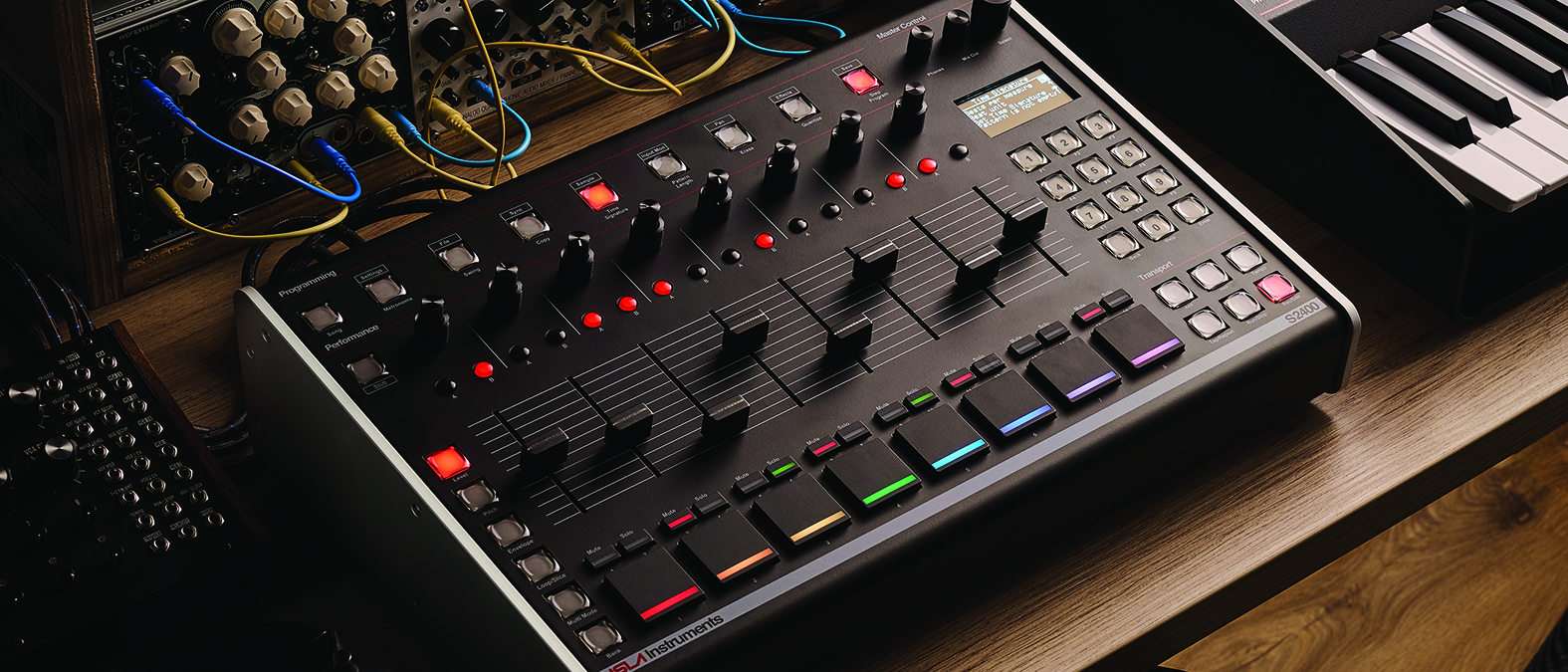MusicRadar Verdict
This looks and sounds great and it seems there’s plenty more to come in its future. Not just made for nostalgia heads, this is simply a great drum machine.
Pros
- +
Authentically captures that gritty, dark 1980s sampler sound.
- +
The Live Looper feature really expands the box’s creative potential.
- +
Isla runs a great forum with a pretty quick response to bugs and feature requests.
Cons
- -
The ’80s sampler workflow may take some getting used to for new users.
- -
No built-in effects currently, so you’ll need to run the tracks through some other gear.
MusicRadar's got your back
Isla Instruments S2400: What is it?
The S2400 is a passion project from boutique manufacturer Isla Instruments which made it its mission to recreate the authentic ’80/’90s sampler sound and workflow but with an updated contemporary feature set.
Originally launched two years ago, the drum machine got a very expansive firmware update earlier this year, so we decided to take a look.
The SP2400 is a visually impressive bit of hardware: seriously chunky with a high-quality look and feel. It’s great to see the machine has a built-in PSU, so all you need is a C13 kettle lead to get powered up.
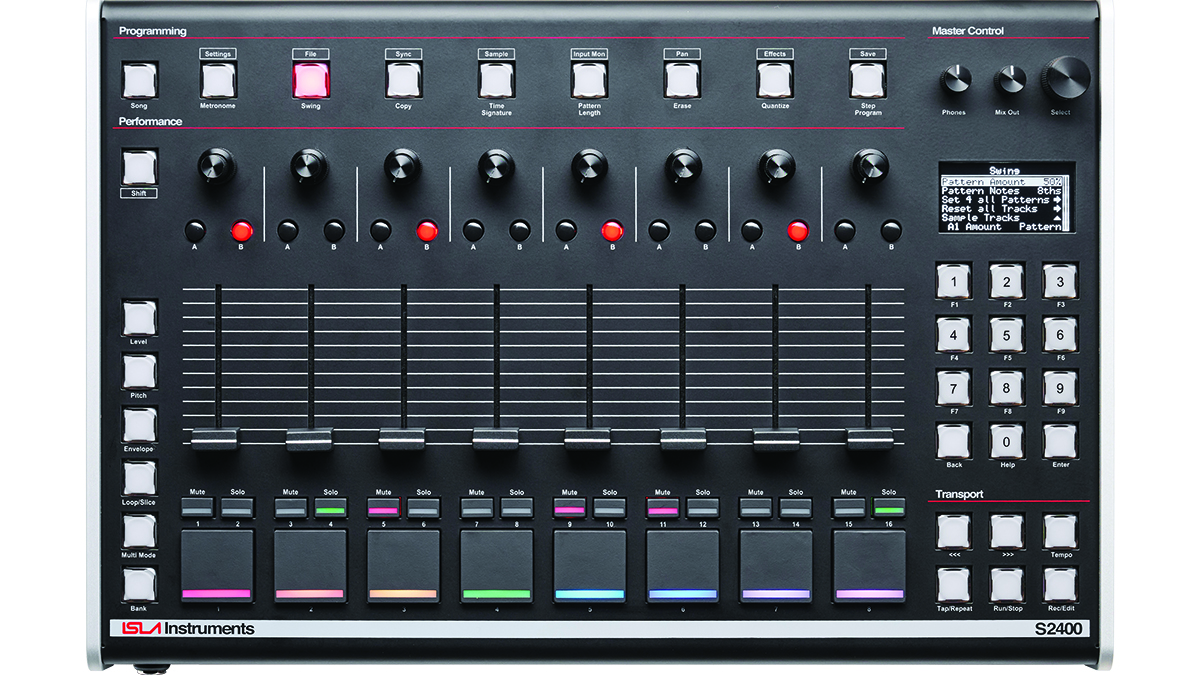
While not being a direct clone, the layout certainly takes a fair bit of inspiration from the E-mu SP-1200. The top row of buttons give you your main housekeeping controls and with the shift button the main pattern mode functions.
On the right is a bright clear OLED screen and a chunky encoder, which is your main input device. Below the screen is a numeric keypad which performs many different functions depending on what you’re doing.
This seems baffling at first but as with all hardware samplers, there is a learning curve here. Fortunately, the help button will remind you what function each button currently performs.
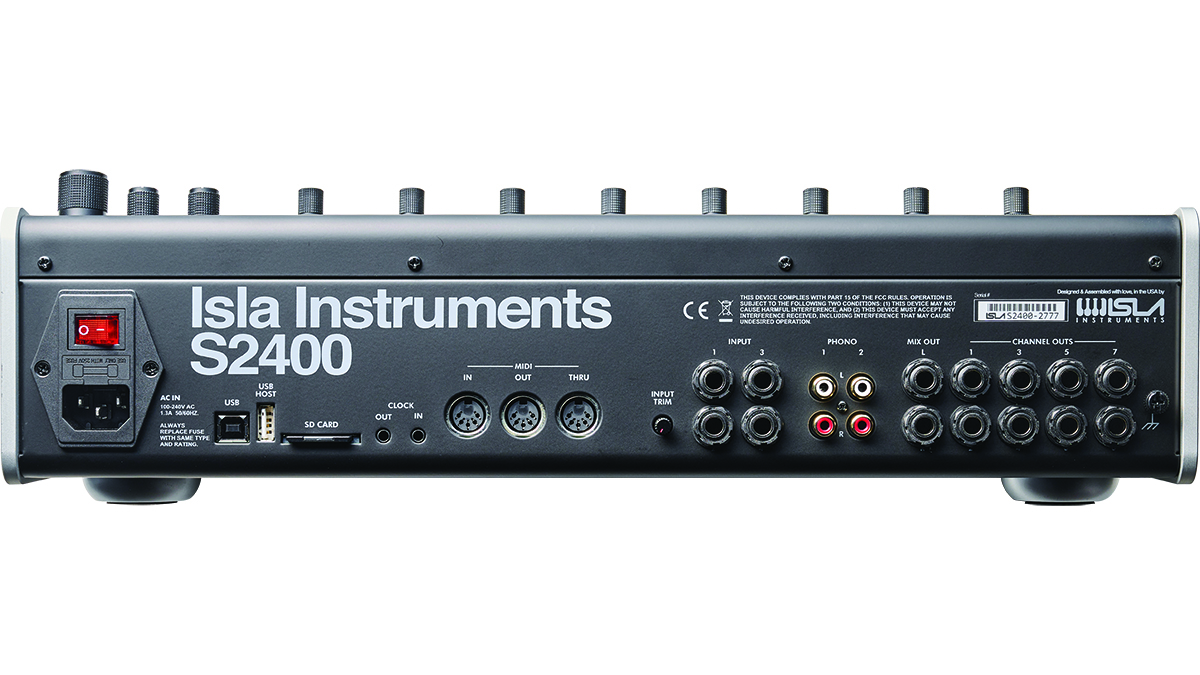
Isla Instruments S2400: Performance and verdict
The drum pads are big, colour-coded and velocity sensitive; they’re nice and responsive and it’s a joy to play. Each channel has a dual encoder; these have different uses depending on the current mode, but in mixer configuration they control the filter with cutoff and resonance.
It’s all about sampling, so pull out your favourite records (or clips) and get busy!
The eight faders are the main controls on the Isla with a row of buttons to the left that defines their function: Level, Pitch, Envelope, Loop/Slice or Multimode.
In the standard mixer mode, they’re simple volume controls but these function independently of the Level setting which is handy for setting relative volume.
In Multimode, you can set all eight pads to play the same sample but with different settings for pitch, level, filter cutoff etc. Very useful for more expressive finger drumming or playing samples chromatically.
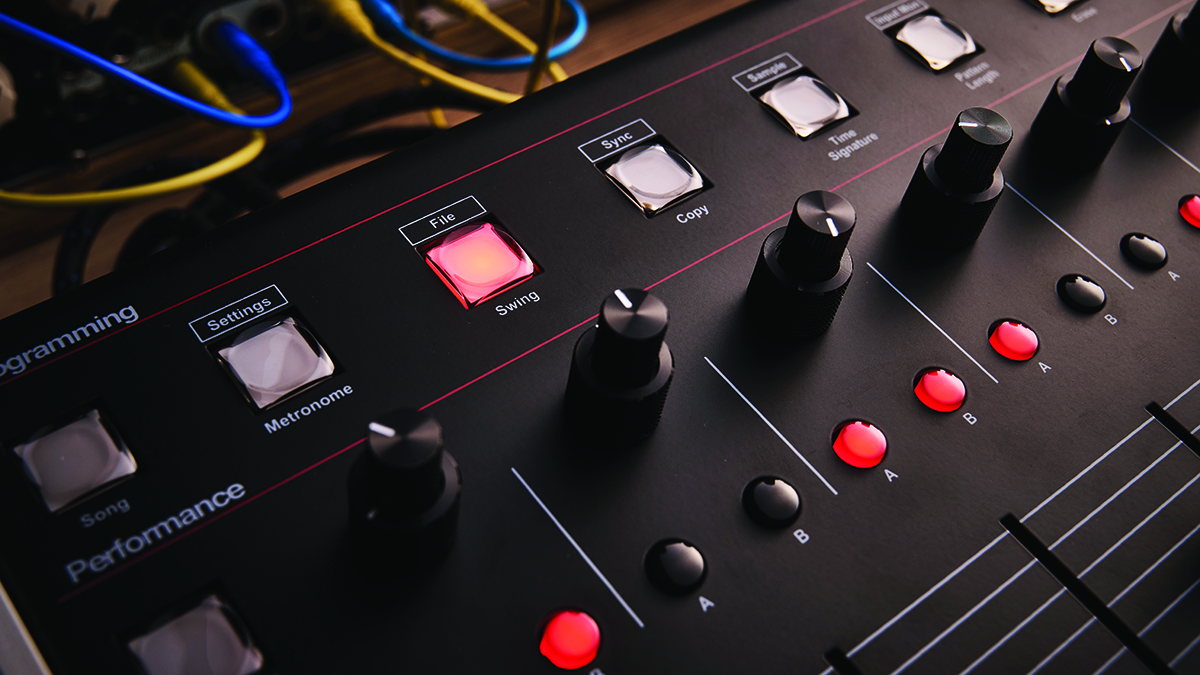
Samples, kits, projects etc are stored on a memory card which can be accessed directly by connecting your computer via USB, which saves a lot of time and hassle.
The S2400 ships with a small selection of built-in drum kits to help you get started, but this machine is all about sampling, so pull out your favourite records (or YouTube clips) and get busy!
Sample slicing is straightforward and reasonably fast – the screen makes it easy to see what you’re doing. Load a loop onto one pad and set to Loop/Slice Multi-mode and it’ll be sliced into eight equal parts.
Samples can be reversed and set to loop a certain number of times but there’s no way to do a forward-then-reverse loop, which is disappointing as it’s a feature we like to use.
Time-stretching is also available and the algorithm sounds authentically close to an Akai S950 for all the junglists.
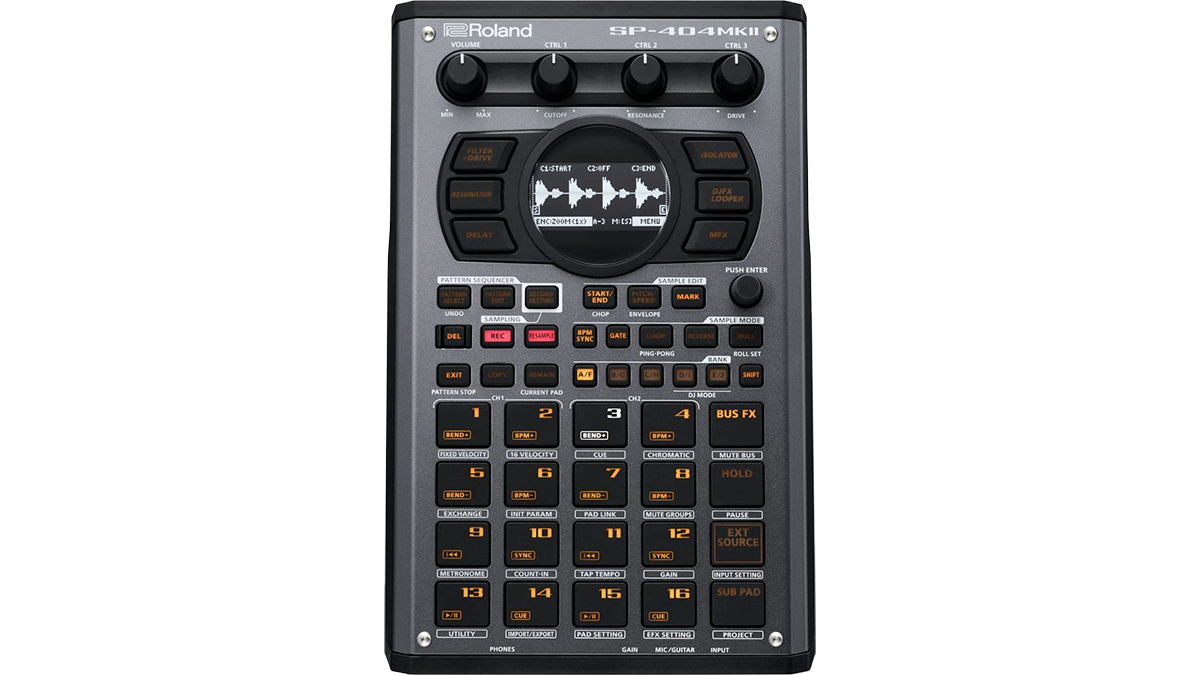
• Roland SP-404 MKII
Roland’s recent update of another classic hip-hop sampler, is a lot lighter on the pocket for producers on a budget. An expanded effect section and an OLED screen are just some of the new features that bring this sampler bang up to date.
• Elektron Octatrack MkII
The Octatrack has plenty of quirks but there’s a reason it’s still a popular machine 12 years after launch. An extremely deep and powerful sampler.
• Rossum SP-1200
Rossum’s re-release of the E-mu SP1200 is practically identical to the original in operation, (including the limitations of the original!). Maximum sample time, however, has been increased from 10 to 20 seconds. One for the (wealthier) purists.
The S2400 offers three modulation envelopes: one a classic ASR for volume and two fully featured AHDSHR. These can be set to control pitch and/or filter cutoff. The filters on the first two channels are analogue and the other six are all digital multimode. An additional analogue filter board is apparently in the works.
Originally only featuring eight channels (with the ability to bounce channels to make more space), the new update has expanded this to 32 sampler tracks (mono or stereo), of which 16 can play simultaneously!
Quantisation can be used for recording or applied afterwards; the highest resolution for recording is 256th notes which is as close to unquantised as is possible. All tracks can be quantised individually.
Once you’ve recorded your pattern, you can enter the note sequencer and cut, paste, and edit your notes as required. Triggers can also be nudged forwards or back for fine tuning the feel or correcting any errors. Alternatively you can enter patterns x0x-style with the mute/solo buttons if you prefer.
The sequencer is not as complex as an Elektron box and doesn’t feature randomisation or probability, but you can alter a lot of settings on a per-step basis. The S2400 also boasts very full featured MIDI implementation so you should have no problem triggering it from your favoured sequencer or DAW.
When you’ve made a few patterns, the Song mode lets you chain them, mute, solo and vary tempo and swing to create full tracks.
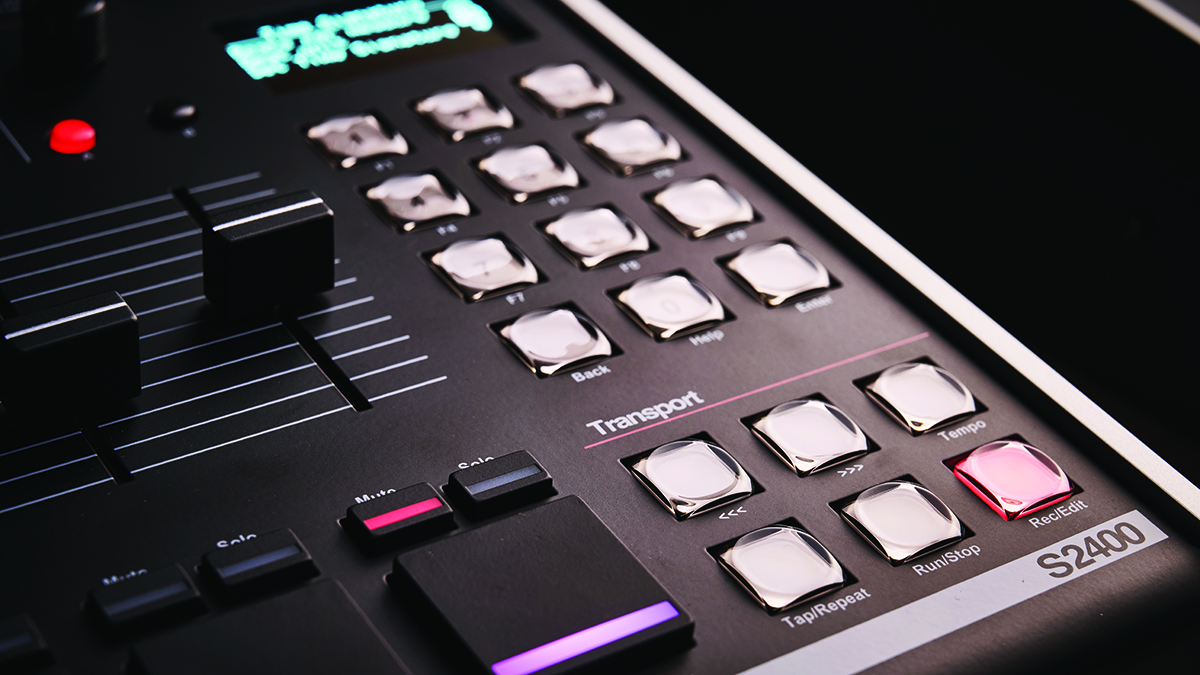
Beyond retro drum machine recreation, Isla seems set on making this a do-it-all groovebox. Up to 32 MIDI-only channels can now be used to control other hardware, and the audio inputs can be used for full live looping functionality which uses Bank D and works on top of the already playing sampler Banks A-C.
One thing missing in this regard is any built-in effects. If these were available, you could easily make full tracks in the box but as it is, you’d need to resample through the external effects.
In a studio, this may not be an issue but for bedroom producers, it will be a frustration and it seems a strange omission in a unit which goes beyond the retro in so many other ways.
There’s talk from the developers of a plugin effects board, so let’s hope this happens soon.
MusicRadar verdict: This looks and sounds great and it seems there’s plenty more to come in its future. Not just made for nostalgia heads, this is simply a great drum machine.
Isla Instruments S2400: The web says
"Isla has hit the sweet spot, staying faithful to what made the SPs great while developing the blueprint into something fresh and relevant. It’s a worthy successor to the iconic SP."
MusicTech
Isla Instruments S2400: Hands-on demos
Isla Instruments
Ricky Tinez
Doctor Mix
Alex Ball
Adam Audio A8H: Specifications
- KEY FEATURES: Rock solid 16Ga cold-rolled steel enclosure with 6mm anodised aluminium sidewalls. Aluminum knobs. 16-bit 48kHz ‘Hi-Fi’ sampling/playback engine or 12-bit 26kHz ‘classic’ sampling/playback engine. Sample up to 21.5 minutes per slot (classic/mono), 5.5 minutes (hi-fi/stereo).
- Multiple sequence entry methods: Live recording, step sequence, piano roll GUI, TR x0x Style. 32 stereo audio tracks w/ 16-voice polyphony.
- CONTACT: Isla Instruments
“Chinese Democracy was a boring record. But calling it Guns N' Roses was not honest. It was totally a solo record”: GN’R’s ex manager takes aim at Axl Rose
“Instead of labouring over a perfect recreation, we decided to make an expanded counterpart”: Chase Bliss teams up with Mike Piera for Analog Man collab based on the legendary King Of Tone
“It’s about delivering the most in-demand mods straight from the factory”: Fender hot-rods itself as the Player II Modified Series rolls out the upgrades – and it got IDLES to demo them
